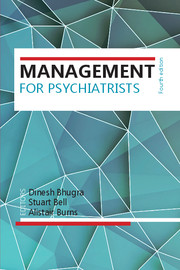Book contents
- Frontmatter
- Contents
- List of contributors
- List of figures, tables and boxes
- Preface
- Part I Theoretical overview
- Part II Changes and conflicts
- 11 Medical leadership skills: what is needed to be a successful leader?
- 12 Understanding systems
- 13 Working with the team
- 14 Managing multicultural and multinational teams in healthcare
- 15 Management of change
- 16 Managing the psychiatrist's performance
- 17 Revalidation for psychiatrists
- 18 Quality improvement tools
- 19 Quality and quality governance
- 20 Measurement of needs
- 21 Service users’ expectations
- 22 Clinical audit
- 23 Confidentiality and management in healthcare organisations
- 24 Patient complaints: every doctor's business
- 25 Mental health review tribunals. Or, tribunals, and how to survive them
- Part III Personal development
- Index
24 - Patient complaints: every doctor's business
from Part II - Changes and conflicts
Published online by Cambridge University Press: 02 January 2018
- Frontmatter
- Contents
- List of contributors
- List of figures, tables and boxes
- Preface
- Part I Theoretical overview
- Part II Changes and conflicts
- 11 Medical leadership skills: what is needed to be a successful leader?
- 12 Understanding systems
- 13 Working with the team
- 14 Managing multicultural and multinational teams in healthcare
- 15 Management of change
- 16 Managing the psychiatrist's performance
- 17 Revalidation for psychiatrists
- 18 Quality improvement tools
- 19 Quality and quality governance
- 20 Measurement of needs
- 21 Service users’ expectations
- 22 Clinical audit
- 23 Confidentiality and management in healthcare organisations
- 24 Patient complaints: every doctor's business
- 25 Mental health review tribunals. Or, tribunals, and how to survive them
- Part III Personal development
- Index
Summary
‘Sometimes when you innovate, you make mistakes. It is best to admit them quickly, and get on with improving your other innovations.’ (Steve Jobs, founder of Apple Inc.)
A complaint is any expression of dissatisfaction which requires a response. What every medical practitioner must appreciate is that behind every complaint, justified or not, is a patient who feels aggrieved. Good governance is required in order to ensure individuals and organisations deal with complaints in a timely fashion, and pick up any trends that might put patients or organisations at risk. Even vexatious or unsubstantiated claims must be dealt with effectively, in order to restore the confidence of the profession in the process, and to minimise the wastage of time and resources. This chapter deals with complaints about doctors from patients or their carers, although similar principles apply to complaints from other health professionals.
Patients are increasingly accessing healthcare to improve their lives, and to live longer, healthier lives. One unintended outcome of this is that doctors as well as others responsible for their treatment are likely to make more mistakes, sometimes with rather serious consequences. Despite the high profile that these cases might take, the practice of medicine is now more innovative, advanced and comprehensive than ever before. Perversely, it is also more risky in terms of causing harm to patients, because patients now have more complex problems, and many are older.
The issue of harm to patients from doctors is nothing new. Hippocrates referred to it nearly 2500 years ago in the oath that defined the ethical principles around the practice of medicine:
‘Into whatever houses I enter, I will go into them for the benefit of the sick, and will abstain from every voluntary act of mischief and corruption; and, further from the seduction of females or males, of freemen and slaves.’
Of course, most doctors do not set out to harm their patients purposely, so when a complaint is made doctors tend to feel a range of emotions, especially when they might have gone that extra mile for the complainant. Having an effective and robust complaints system ensures that justifiable lessons are learned not just by the doctors but by patients too, through the process, allaying some of the fears about patient complaints. Undoubtedly, analysing complaints has the prospect of enhancing patient safety (Reader et al, 2014).
- Type
- Chapter
- Information
- Management for Psychiatrists , pp. 347 - 361Publisher: Royal College of PsychiatristsPrint publication year: 2016



